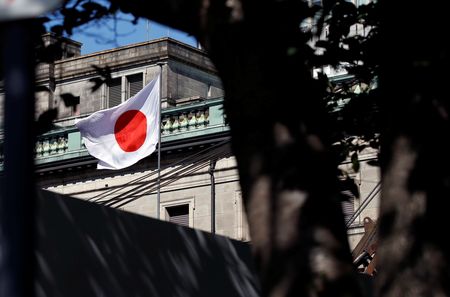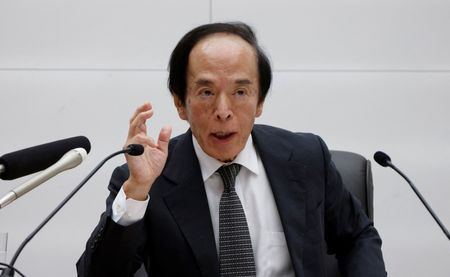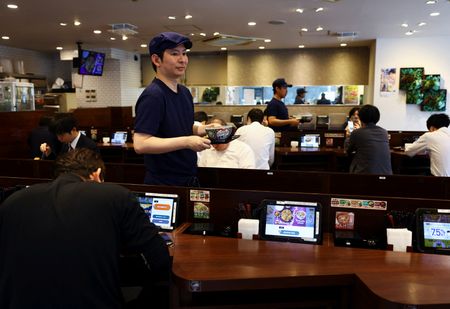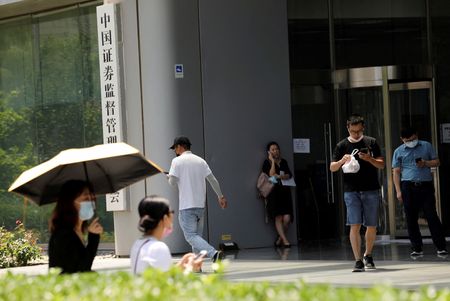By Junko Fujita and Kevin Buckland
TOKYO (Reuters) -Japanese markets are bracing for a crucial ruling party vote this weekend that will determine the next prime minister and set the tone for budget and central bank policies.
The race to head the Liberal Democratic Party has centred on household relief versus fiscal discipline. Overhanging those deliberations is the question of whether Japanese shares can chart new highs and calm will return to its volatile bond market.
Since Shigeru Ishiba, a fiscal hawk, announced his resignation last month, investors have bet that any successor will be more liberal with spending. Among the front-runners, party veteran Sanae Takaichi could trigger even more bond market uncertainty, while farm minister Shinjiro Koizumi and top government spokesperson Yoshimasa Hayashi are less likely to rock the boat.
As Saturday’s vote approached, a retracement in the Nikkei share gauge along with a decline in long-term bond yields signalled bets that Takaichi will either come up short or rein in her most expansionist instincts if she prevails.
“So far we expect either Koizumi or Hayashi may win the election, and they are not trying to interfere with Bank of Japan policy,” said Takashi Fujiwara, chief fund manager at Resona Asset Management’s fixed income investment division. “Even if Takaichi wins, she has toned down her appeal for maintaining loose monetary policy.”
RATTLED BOND MARKET
The Japanese government bond (JGB) market has been on edge since late May due to waning demand among traditional buyers, decreased support from the central bank, and concerns about swelling debt.
The sector was dealt another blow in July, when Ishiba’s coalition lost seats in the upper house to outsider parties campaigning on tax cuts and increased spending. Speculation mounted that he would resign, and Takaichi, who finished second behind Ishiba in a run-off vote last year, would swoop in as Japan’s first female prime minister.
The so-called Takaichi trade was long on stocks and bearish on JGBs, particularly longer tenors, on expectations she would push for tax cuts, fiscal stimulus, and easy monetary policy.
The 30-year JGB yield surged to a record high 3.285% on September 8, the first trading day after Ishiba announced he was stepping down. The Nikkei marched to successive all-time highs, setting an intraday record of 45,852.75 on September 19.
As the campaign heated up, Takaichi said she would not immediately pursue sales tax cuts and was mostly silent on central bank policy, causing some unwinding of her namesake trade.
Even so, a victory by Takaichi would likely prompt the biggest reaction via a steepening of the JGB yield curve and yen depreciation, said Carl Ang, a fixed income research analyst at MFS Investment Management.
“Given her image as a foreign policy hardliner, bond and currency markets may start factoring in more substantial JGB-financed spending increases to defence, for example,” he added.
Koizumi, the son of former premier Junichiro Koizumi, said his government would compile a package of measures to cushion the blow to households from rising prices. Hayashi, the dark horse, ruled out the need for large-scale stimulus and said he backed the BOJ’s plan to raise rates.
Traders have largely priced in Koizumi’s victory, so it would lead to a subdued reaction on Monday, said Kazuaki Shimada, chief strategist at IwaiCosmo Securities.
“If Takaichi wins, it becomes a positive surprise, and the stock market could surge,” Shimada said.
Yields on shorter-term JGBs, those most sensitive to central bank policy, jumped to 17-year highs at the end of September as bets increased the BOJ would hike rates as soon as this month.
That movement, which has flattened Japan’s yield curve, reflects growing bets that Koizumi will win and give the BOJ free rein on policy, said Shoki Omori, chief desk strategist at Mizuho Securities. But a looming worry is whether Koizumi would concede to tax cuts pushed by outsider parties as he looks to form a wider coalition.
“That would be more scary, but we don’t know about that part just yet,” Omori added.
(Reporting Junko Fujita and Kevin Buckland in Tokyo; Writing by Rocky Swift; Editing by Sam Holmes)











